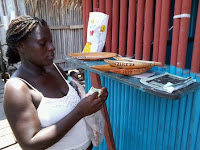 45
year old Mensah Kasapa was born at Nzulezo, a community built on stilts and
platforms suspended above the Amanzuri Lake in the Jomoro District of Ghana’s
Western Region.
45
year old Mensah Kasapa was born at Nzulezo, a community built on stilts and
platforms suspended above the Amanzuri Lake in the Jomoro District of Ghana’s
Western Region.
He
has lived here long enough to understand the intrigues of life on top of the
waters.
The
over 550 inhabitants of Nzulezo are predominantly farmers and brewers of local
dry gin, known as ‘Akpeteshie’. “It is not profitable to fish in the dry season”,
said Mensah, though the inhabitants go fishing during the rainy season.
Life
is difficult, he complained, referring to the subsistent agricultural
activities of the community.
According
to Mensah, the routine journey through the waters to the farmlands takes well over
three hours and about an hour to cross over to their raffia palm plantations.
Traditionally,
the men go farming, whilst the women sell the gin and farm produce on markets
in other towns.
Today,
Nzulezo is a major tourist attraction – tourism is profitable and beneficial to
the people, who are believed to have migrated as refugees from Mali, led by a
Snail God some 400 years ago.
Mensah’s
hand crafted miniature canoes sell good to tourists who troop to the enclave to
experience the way of life of the people and the water-dominated natural
landscape. The lake is healthy with tilapia, catfish, mudfish and crocodiles and
monkeys abound in the forest.
Indeed,
the isolated Nzulezo is increasingly growing as a paradise for tourists and domestic
holiday makers, who mostly cruise through the Amanzuri Lake to visit the
village.
Visitors
also spend good time in the village of Beyin to learn about Nzema culture and
history at the Fort Apollonia Museum.
 Fort
Apollonia at Beyin in the Jomoro District was the last fort to be founded by
the British along the Gold Coast. It is now the home of an eco-museum dedicated
to Ghana’s first President, Dr. Kwame Nkrumah, the most important figure to
come from the Nzema area.
Fort
Apollonia at Beyin in the Jomoro District was the last fort to be founded by
the British along the Gold Coast. It is now the home of an eco-museum dedicated
to Ghana’s first President, Dr. Kwame Nkrumah, the most important figure to
come from the Nzema area.
Curator
and Manager of the Museum, Samuel Nobah is enthused at the high rate of domestic
tourists trooping to the area.
“In
combination with Nzulenzo, it attracts a lot of tourists from all over the
world, so in a sense we’re able to obtain income; it’s also helping
inhabitants, especially the food vendors, hoteliers and restaurant operators to
obtain some income from the visitors who come here; and in our records we have
the largest number of the local visitors, especially students”, he stated.
Nzulezo,
which means ‘surface water’ in the Nzema language, was in 2000 nominated as a UNESCO
World Heritage Site.
 The
village can be reached only by a canoe; there is a church and a primary school –
all children have their boats to commute to other communities to access Junior
High School.
The
village can be reached only by a canoe; there is a church and a primary school –
all children have their boats to commute to other communities to access Junior
High School.
But
there is no healthcare facility – the Nzulezo community wants government to provide
health centre as well as offer incentives for teachers to take up postings to
the only primary school in the area.
Mensah
has called for a review of the formula for sharing proceeds earned from
visitors, stating that “there is no fairness in the arrangement”. “Six communities
share proceeds and we only get 12 percent, for me this is unacceptable because
we are the ‘Zoo’ that attracts people”, he said.
 The
Nzulezo community also wants the government to invest in speed boats to ease
the burden on tour guides who are challenged in serving the increasing number
of visitors, especially during festive occasions.
The
Nzulezo community also wants the government to invest in speed boats to ease
the burden on tour guides who are challenged in serving the increasing number
of visitors, especially during festive occasions.
Story
by Kofi Adu Domfeh






1 comment:
It needs investment attention for the great potential it holds. Good job.
Post a Comment